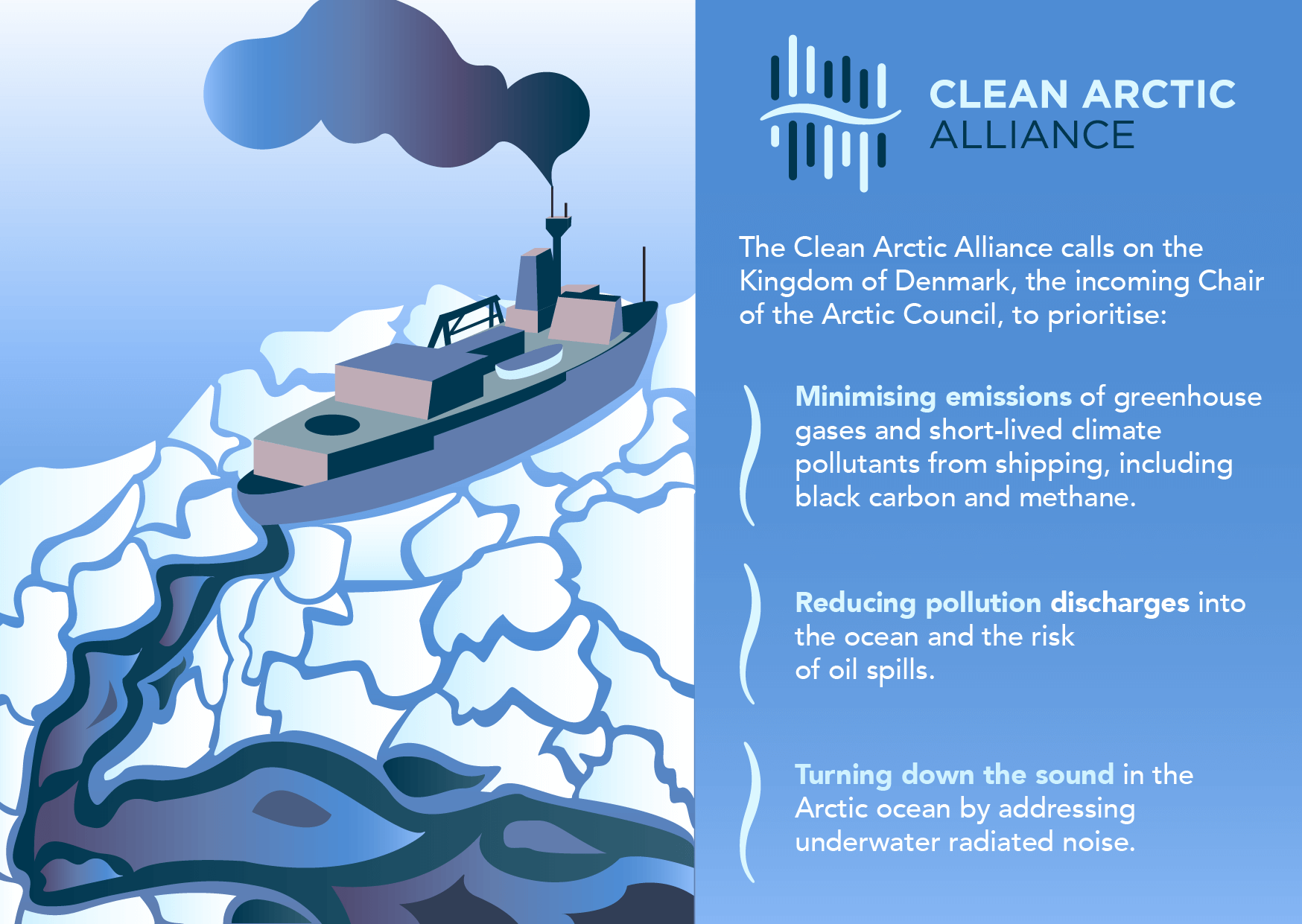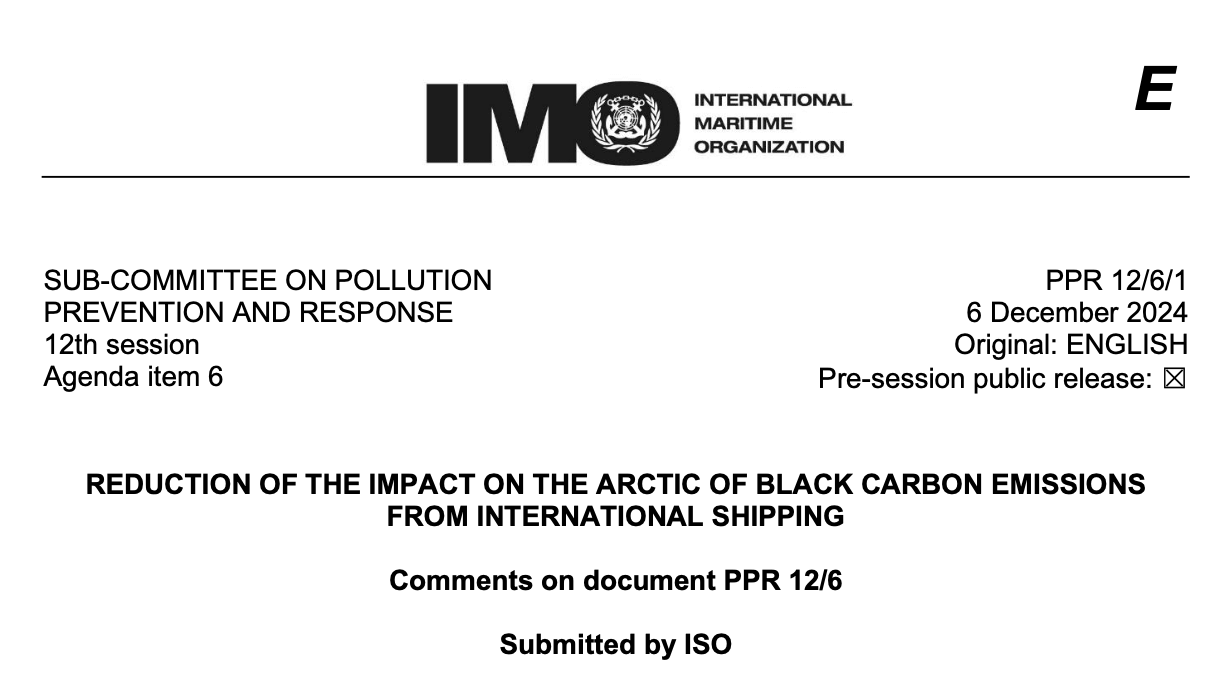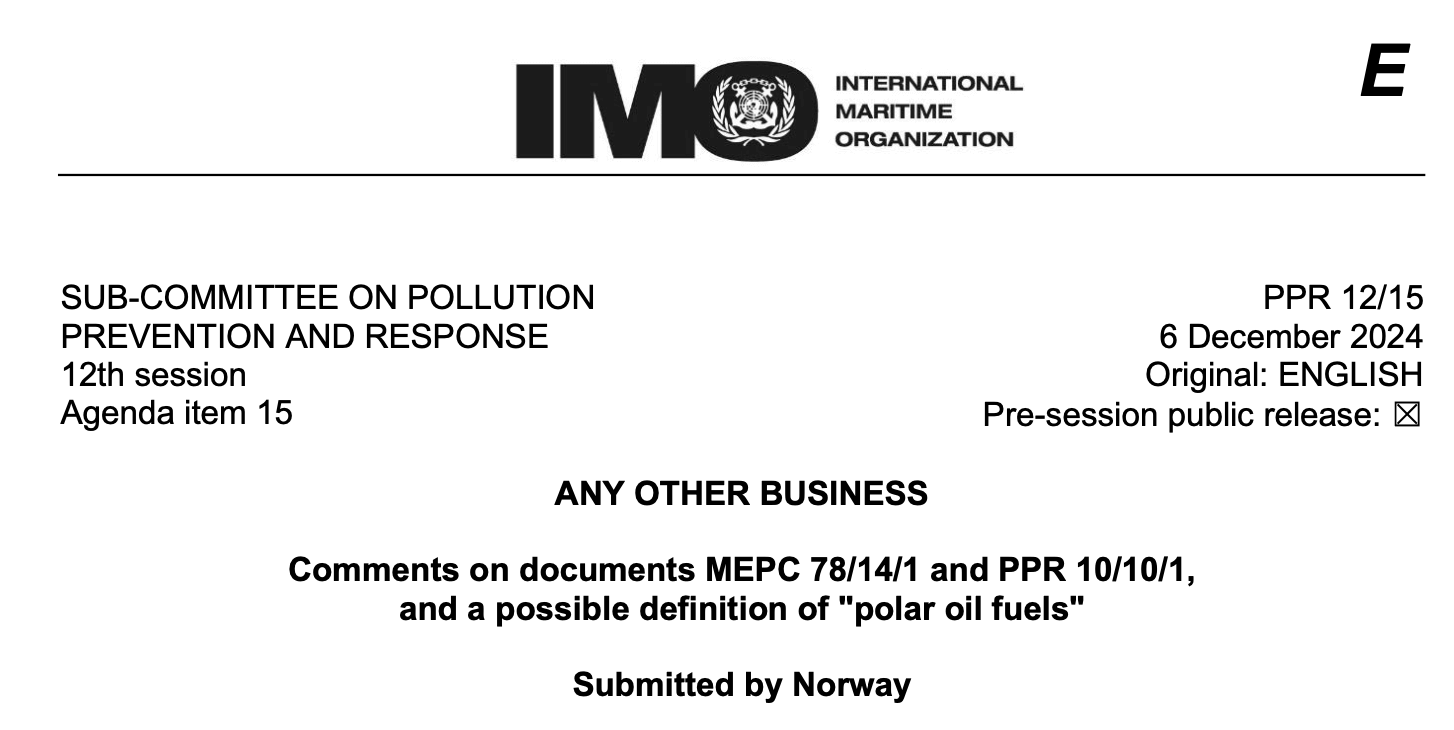
The Arctic is facing unprecedented change. During its two-year Chairship of the Arctic Council, the Kingdom of Denmark will need to focus on reducing climate emissions impacting the Arctic, reducing pollution of the Arctic marine environment and the risk of oil spills, and developing green energy solutions which benefit people and wildlife in the Arctic. These comprehensive themes provide the Kingdom of Denmark with the opportunity to demonstrate global leadership with respect to a region of the world that is in serious trouble.
The Kingdomg of Denmark’s priorities during its leadership of the Arctic Council will be critical to the future health of the Arctic Ocean. The time to act is now.
During the Kingdom of Denmark’s (KoD) Chair of the Arctic Council, the Clean Arctic Alliance urges KoD to prioritize safeguarding the Arctic environment while supporting sustainable development in the region.
To help accomplish this, and by taking special focus on new measures to mitigate the impacts of Arctic shipping, the Clean Arctic Alliance calls upon the KoD to:
- Minimize emissions of greenhouse gases and short-lived climate pollutants from shipping, including black carbon and methane.
- Reduce pollution discharges into the ocean and the risk of oil spills.
- Turn down the sound: quiet the Arctic ocean by addressing underwater radiated noise.
The Arctic has already warmed by 2.5 o C. International shipping is one of several sectors contributing to that heating, through emissions of both greenhouse gases and short-lived climate forcers such as black carbon (BC) Coupled with these emissions, growth in international shipping in the Arctic, both in terms of numbers of ships and increasing distance being sailed, is leading to increased marine pollution and greater levels of disturbance. KoD’s actions during its leadership (2025–2027) will be critical to the future health of the Arctic Ocean, the people that depend on it, and the global climate systems. These priorities provide an opportunity for KoD to demonstrate global leadership by addressing challenges in a region experiencing extreme year-round temperature changes, record low summer sea ice, and earlier opening of Arctic sea routes. The time to act is now, and the Clean Arctic Alliance recommends the KoD take action to protect the ARCTIC ENVIRONMENT by:
- Promoting the development of a zero-emission vision for Arctic shipping and supporting a roadmap to transition from oil-based fuels to cleaner, non-fossil alternatives, along with the necessary onshore infrastructure.
- Encouraging Arctic nations to adopt the IMO’s resolution MEPC.342(77) , which advocates for using distillate or cleaner fuels in or near the Arctic, and endorsing the ‘polar fuel’ concept at the IMO leading to regulation.
- Implementing the Arctic heavy fuel oil (HFO) ban by immediately eliminating waivers and other loopholes that allow its use until the year of 2029, and steering clear of investing in or supporting the use of LNG as a marine fuel because of its lack of life cycle GHG reductions and supply chain methane leaks.
- Calling for the prohibition of the use of Exhaust Gas Cleaning Systems (scrubbers) and the discharge of scrubber waste in the Arctic.
- Encouraging the IMO to develop Arctic-specific recommendations and mandatory measures to significantly reduce underwater radiated noise by 2030.
- Strengthening regulations on marine plastic litter, sewage discharges and developing Arctic-wide regulations on graywater discharge.
- Promoting further reductions in shipping’s impacts on priority Arctic ecosystems and species by establishing green shipping corridors with both biodiversity and climate goals which include vessel routing, speed reductions, and designation of shipping-free zones.
Promote CLIMATE AND GREEN ENERGY SOLUTIONS by:
- Advocating for mandatory IMO measures to reduce and eliminate black carbon emissions from Arctic shipping amendments through MARPOL Annex VI, and supporting the uptake of diesel particulate filters (DPFs) which offers a ship based technical solution to reducing black carbon.
- Convening Arctic states, within the context of the IMO, to designate all regions of the Arctic an emission control area (ECA).
- Encouraging Arctic states to reduce black carbon emissions in line with 1.5°C warming pathways, the latest science, and Indigenous Knowledge. For shipping, this requires reductions in the range of 75% by 2030 and 95% by 2035 from 2013 levels, across the whole of the Arctic.
- Supporting short-term measures to reduce greenhouse gas emissions from Arctic shipping, including speed reductions, installation of wind-assist technology, and increased energy efficiency measures.
Support PEOPLE IN THE ARCTIC by:
- Supporting the rights of Indigenous communities to protect their livelihoods and resources by reducing black carbon emissions to slow snow and ice melt, and implementing a strong HFO ban to protect vital subsistence resources like fishing and hunting, essential for Arctic Indigenous peoples’ food security and cultural identity.
- Promoting a just and equitable transition that directly benefits Arctic Indigenous communities through cleaner alternative non-fossil fuels and increased use of renewable energy (eg, solar, wind, and battery storage), alongside the HFO ban.
Develop a STRONGER ARCTIC COUNCIL by:
- Recognizing and addressing the lack of trained emergency responders and equipment for search, rescue, and oil spill response in the Arctic.
- Strengthening cooperation among Arctic nations to collaboratively respond to shipping accidents, including oil and chemical spills.
This cohesive and actionable plan emphasizes KoD’s critical role in shaping the Arctic’s future during its chair of the Arctic Council.
About the Clean Arctic Alliance
The following not-for-profit organizations form the Clean Arctic Alliance:
Alaska Wilderness League, Bellona, Clean Air Task Force, Ecology and Development Foundation ECODES, Environmental Investigation Agency, Equal Routes, Eurasian Wildlife & Peoples, Friends of the Earth US, Global Choices, Green Global Future, Green Transition Denmark, Greenpeace, Iceland Nature Conservation Association, International Climate Cryosphere Initiative, Nature And Biodiversity Conservation Union, Ocean Conservancy, Pacific Environment, Seas At Risk, Stand.Earth, Surfrider Foundation Europe, Transport & Environment, WWF, Zero, 90 North Foundation




